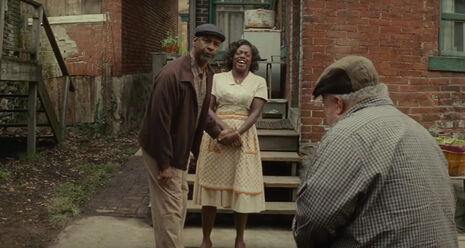Review: Walled in by ‘Fences’
Denzel Washington successfully captures the isolation of August Wilson’s play in this screen adaptation says Alex Izza

A dysfunctional family struggling in the grip of poverty: the premise of Fences is a tale as old as time. Yet Denzel Washington’s screen adaptation of August Wilson’s play feels fresh and potently relevant. It beautifully balances tight family drama and sweeping exploration of societal change, charting the life of a small African-American family in Pennsylvania in 1956 and their attempts to build a life in the tumult of post-war America.
Washington plays Troy Maxson, the brooding patriarch of Fences. He brings a glorious intensity to every scene he inhabits, casting a shadow every time he opens the door. Each stride forward has purpose, as Washington uses his physicality to present this character wedded to control over the domestic space where he is the boss. Viola Davis as Rose is a brilliant foil to Washington, providing a subtler performance that mellows his physicality and portrays hints of of genuine affection between the pair. However, as their broadly functional marriage descends into abuse, thinly veiled submissiveness on Davis’s part evolves into roiling anger – delivered for the viewer in several stunningly performed pieces of dialogue between Washington and Davis.
“In a year when Hidden Figures and Moonlight have put the performances of actors of colour deservedly back at the forefront of awards-worthy pictures, Fences is a worthy addition”
“Times have changed, you just came along too early.” By setting itself in the post-Second World War era, Fences teases out the evolution in aspirations created by the war. Washington’s baseball bat lying in the yard has an idol-like quality, portraying the lost dreams of a man who lived ‘too early’ under rigid segregation to become a baseball star. This creates a gulf in identity between father and son, with Adepo’s earnest efforts for his father’s acceptance met with steely resistance. Washington, therefore, becomes a check on his son’s lofty ambitions in the desegregation of post-WWII America, projecting his own resentment at being too ‘early’ to truly benefit from these changes, and clamping down on his son’s dreams of playing college football.
Visually, Fences is largely set in the Maxson family, creating a suffocating closeness that allows the theatrical quality of its long monologues and extended dialogue to shine. By using such a tight portrayal of space, Washington’s dislocation is reinforced for the viewer as he begins to lose control of the domestic domain where he is the boss. The titular subject of Fences is a reaction to this seeming assault on his rigid, pre-war patriarchal identity, with Washington constructing the fence around his home to build an ark against the tide of modernity.
The film is not without its problems. Time skips and scene changes away from the house seemed arbitrary, losing narrative momentum, and the theatrical closeness that elevates the family drama. This has the effect of making Fences have a disjointed quality, becoming a series of beautifully acted scenes that lack the thread to hold them all together. Regardless, in a year when Hidden Figures and Moonlight have put the performances of actors of colour deservedly back at the forefront of awards-worthy pictures, Fences is a worthy addition that puts the often neglected post-war period back on the screen.
Despite its structural limitations, stunning performances by Viola Davis and Denzel Washington mitigate these failings. Through their performance they give voice to powerful themes of race, family, and identity as relevant today as they were in the 1950s.
 Interviews / You don’t need to peak at Cambridge, says Robin Harding31 December 2025
Interviews / You don’t need to peak at Cambridge, says Robin Harding31 December 2025 News / Downing investigates ‘mysterious’ underground burial vault 29 December 2025
News / Downing investigates ‘mysterious’ underground burial vault 29 December 2025 News / Unions protest handling of redundancies at Epidemiology Unit30 December 2025
News / Unions protest handling of redundancies at Epidemiology Unit30 December 2025 Lifestyle / Ask Auntie Alice29 December 2025
Lifestyle / Ask Auntie Alice29 December 2025 Features / ‘Treated like we’re incompetent’: ents officers on college micromanagement30 December 2025
Features / ‘Treated like we’re incompetent’: ents officers on college micromanagement30 December 2025








